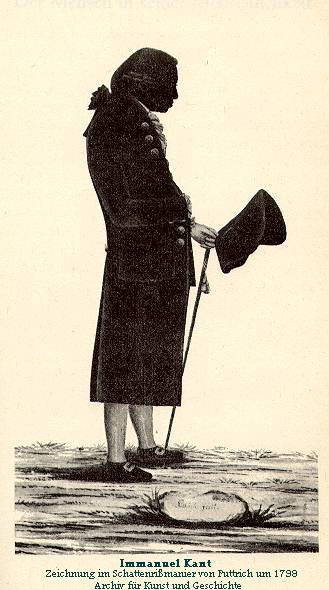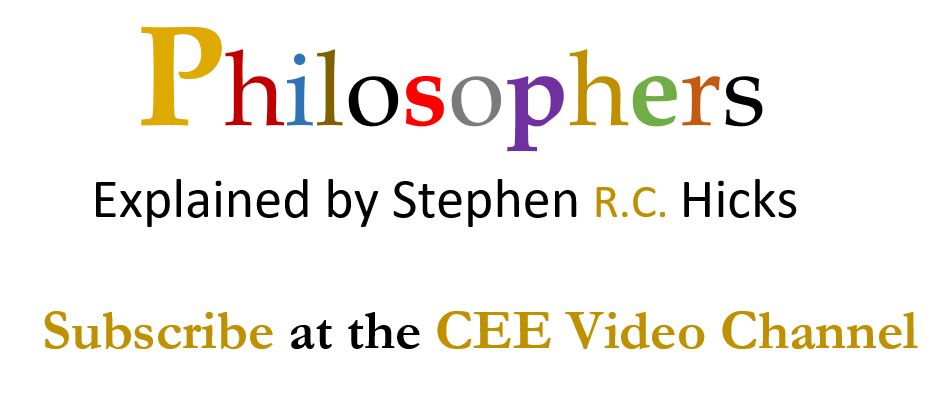
Kleist was widely traveled, energetic, a brilliant writer — and a suicide at age 34. Why? In reviewing Selected Prose of Heinrich von Kleist, Ian Brunskill writes:
“Kleist in his youth had espoused with enthusiasm all the optimism of the Enlightenment. Reason would conquer all; happiness would come with experience and understanding. In March 1801, however, by his own account, he seems to have encountered the thought of Immanuel Kant (it is not clear what precisely he read), and his world fell apart. By testing the nature and limits of human knowledge, Kant had sought primarily to establish the possibility of a meaningful metaphysics. To Kleist, however, it was much grimmer than that: Kant had shown, he believed, that empirical knowledge was unreliable, reason illusory, truth unattainable and life quite meaningless. ‘My sole and highest goal has vanished,’ he wrote. ‘Now I have none.'”

In my Explaining Postmodernism (p. 81), I quoted Nietzsche on Kant:

“As soon as Kant would begin to exert a popular influence, we should find it reflected in the form of a gnawing and crumbling skepticism and relativism.”
That quotation continues with Nietzsche’s making a direct connection to Kleist: “and only among the most active and noble spirits, who have never been able to endure doubt, you would find in its place that upheaval and despair of all truth which Heinrich von Kleist, for example, experienced as an effect of Kant’s philosophy. ‘Not long ago,’ he [Kleist] once writes in his moving manner, ‘I became acquainted with Kant’s philosophy; and now I must tell you of a thought in it, inasmuch as I cannot fear that it will upset you as profoundly and painfully as me.'”
See also C. August’s excellent, extended follow-up post on Kleist, Kant, and the competing readings of the two.

(My episode on Kant’s Critique of Pure Reason leads off the Philosophers, Explained series.)
Indeed, with much knowledge is much grief. I was happier, I think, when I was certain about my metaphysics.
WoundedEgo, I find with much sophistry comes much annoyance, such as hollowing out a core concept’s definition e.g. of knowledge and filling it with that of another e.g. of being in order to implode it.
Who knew that pursuing knowledge could be the most detrimental aspect of your physical life. I’ve concluded that philosophy and sophistry are interchangeable terms. Much of philosophy is the attempt to articulate our inner thoughts and pursuits, which can never be achieved, because these things are inherent not articulate.
When I say something to you I provoke a thought in your inherit mind, but there is no way for me to actually explain these things literally, because it’s not a literal thing.
We can’t explain things in and of itself, but we know what they are inherently.
Leaving aside political and sociological interpretations for doing philosophy and assuming Kant to be correct, I still do not see how his thoughts destroy truth. As an example suppose that even something as objective and fundamental as navigation directions, such as North, was not real or stable, but that the concept we consistently askew but a few degrees and changed slowly but predictably. Surely this new calculation, lets call it “magnetic North” would operate in exactly the same manner as a a true North with the addition of a new calculation added to the mix. Why not, do the same with “noumenon?” That chair is not what you are really seeing or experience!. OK. I can still reliably sit upon it and so do you Mr. Kant. You have been Hume-ed Sir!
Kant closed the doors of perception. He was known as the hammer, but lock Smith is also a good game for his enterprise. Kant demonstrated how all of this is a kind of Maya. No need to kill ones self over a dream mind.
duh, Kleist died by suicide together with a close female friend who was terminally ill.